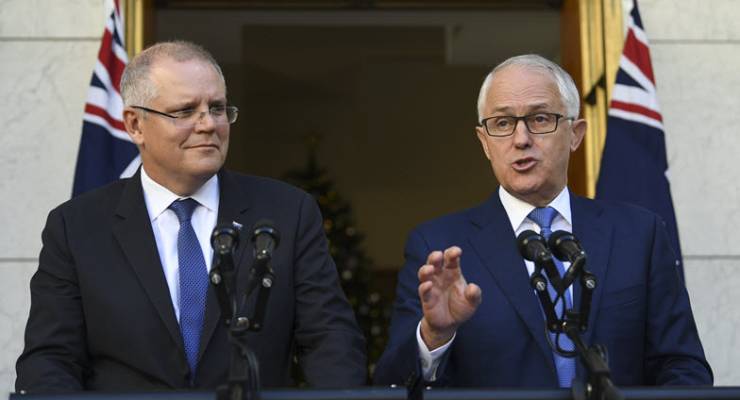
Despite five years of wage stagnation under the Coalition, policymakers and the commentariat still refuse to take it seriously, generally preferring a Pollyannaish view that the whole problem will go away next year.
We’ve been pointing that out for a while but it continues. Last week, the Prime Minister insisted that jobs growth will take care of wages. “As you get more demand for labour as jobs growth continues then you will see wage rises follow,” he insisted in the wake of another rotten set of Wage Price Index (WPI) results. Reserve Bank governor Philip Lowe has several times gone deeper into the issue. In June he discussed the impact of new technology and “cost-control mentality”. Later that month at a conference in Portugal, he broached an issue hitherto verboten here, referencing a German paper that discussed “changes in the industrial relations landscape in Germany [which have] affected wage and employment outcomes”. “The Australian experience is very similar to the German one,” Lowe noted. “It is hard to escape the conclusion that changes in the industrial relations process has changed the inflation process.”
But speaking on Friday to the House of Representatives Standing Committee on Economics, Lowe reverted to Pollyanna mode:
We had another reading on the Wage Price Index a couple of days ago, which showed a welcome uptick. Over the past year, the Wage Price Index increased by 2.1% and the broader measure, which captures bonuses, increased by 2.5%. These figures are both up from a year ago… the unemployment rate has fallen to 5.3 per cent, which is the lowest it has been for some years. Taken together, these data are consistent with our view that wages growth and inflation will pick up gradually over the next couple of years…
The fall in the unemployment rate was mainly due to a fall in the participation rate, down to 65.7% from 65.5%. Just 4000 new jobs were created in July — a sharp slowdown from 51,000 in June. On the more accurate trend basis, the jobless rate was steady at 5.4%. A participation rate of 65.5% is still great by historical standards, and an important achievement of the Turnbull government. But the story of 2018 has been that while we’re still enjoying jobs growth, it’s significantly slower than the boom of 2017. In the year to January, more than 395,000 net new jobs were created; in the year to July, trend employment grew by around 300,000 persons.
And remember, the growth of 2017 didn’t deliver wages growth at all. That is, except in the two sectors that actually drove that jobs growth, health and social care and education, and even then it was tepid.
[Wage stagnation is a major failing of our governing class]
It seems policymakers are trying to shift the goalposts and convince us that wages growth in the 2-3% range — which is barely ahead of inflation, and mean some private sector workers are going backwards — is a great achievement. Still, that’s better than the neoliberals and reactionaries at the Financial Review. Editor Michael Stutchbury has attacked people concerned about wage stagnation as “whingers” and has campaigned, along with a claque of wealthy economists, including some who don’t even live here, for the RBA to raise interest rates even if it undermines jobs growth.
Things are a bit different in the US. Wages growth has actually fallen in recent months in the US despite unemployment around 4% and the Trump company tax cuts. Why? Later this week, the Kansas City Federal Reserve’s annual Jackson Hole seminar will take on the issue as part of an examination of “Changing Market Structure and Implications for Monetary Policy”.
As Crikey discussed last week, the increasing dominance of corporate giants (Apple, Facebook, Google, not old industrials like GE or the banks) in the American economy is attracting attention from economists. This issue will be front and centre at Jackson Hole, according to the Financial Times: the potential for this rising corporate power to weaken wages, depress labour’s share of income and undermine investment — and whether antitrust authorities need to take a tougher line.
Here we’re still stuck in the neoliberal paradigm that what’s good for big corporations — like company tax cuts — is good for everyone, despite the avalanche of evidence from finance and energy that all they do is steal from customers, suppress wages and use their political power to cripple regulators.









It is a major concern that this government is continuing to push for company tax cuts, when many companies pay little or no company tax to begin with.
They reap huge profits from the population through dubious and unethical means and the governments of both sides do nothing?
Avarice is the only motivation in Australian political and business circles, they service and/or represent no one besides themselves.
Funny? I don’t remember our msm reporting on Lowe’s reference to that German paper, while in Portugal?
Turbull et all have failed their major kpi’s. How come they get a pay rise while the rest us stagnate; who do they think they are, big business or banking CEO’s.
Turbull et all have failed their major kpi’s. How come they get a pay rise while the rest us stagnate; who do they think they are, big business or banking CEO’s.
Sorry about double post mods, blame Turnbull’s NBN.
Jessica Irvine in the weekend SMH was also prattling the RBA/Turnbull line. They seem to have forgotten that our economy is about to cop a flogging from a few things like a Great Big New Drought. There are no dryland crops with 100km of where I live and 200 km in most directions It is a shocking season, like no other I have seen in my life (60 + years)